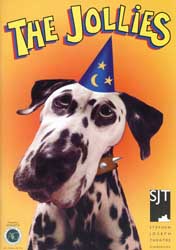| The Jollies | |||
|---|---|---|---|
 | |||
| Written by | Alan Ayckbourn | ||
| Characters | Polly Billy Jilly Mr. Magico Rambo | ||
| Date premiered | 3 December 2002 | ||
| Place premiered | Stephen Joseph Theatre, Scarborough | ||
| Original language | English | ||
| Subject | Magic | ||
| Genre | Children's | ||
| Setting | Billy Jollie's seventh birthday | ||
| Official site | |||
| Ayckbourn chronology | |||
| |||
The Jollies is a 2002 children's play by British playwright Alan Ayckbourn. It is about a young girl, Polly Jollie, where a magic trick gone awry at her brother's birthday party causes her brother, Billy, to age 25 years, and her mother, Jilly, to become 25 years younger. The play is viewed by some as the inspiration for his 2006 adult play If I Were You .